European election results: At a glance
- Published
Here are the key results of the 2014 European elections.

Turnout
Overall, increased by 0.1% to 43.1%, after decades of decline. Belgium, where voting is compulsory, recorded 90% attendance while Slovaks showed the least enthusiasm - just 13% turned out.

The party blocs
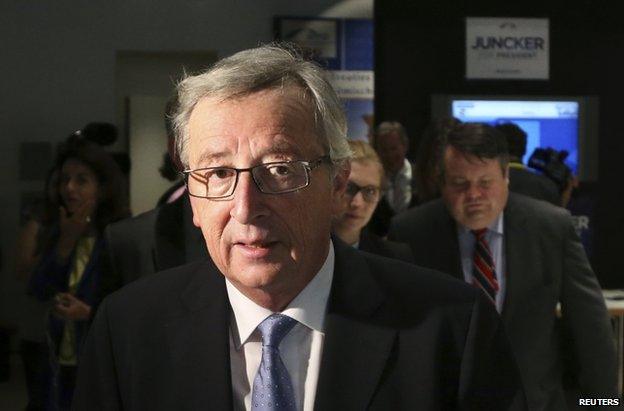
Jean-Claude Juncker thinks the result will enable him to become European Commission president
The centre-right EPP is set to take the largest share of the seats, with an estimated 208 - against 186 for the centre-left S&D bloc.
The EPP choice for president of the European Commission, former Luxembourg Prime Minister Jean-Claude Juncker, has already claimed the post for himself, despite opposition from the UK's ruling Conservative Party.
Soundbite: "I don't care. I'm not on my knees. I won the election" - former Luxembourg Prime Minister Jean-Claude Juncker, speaking about his critics.

France and the UK
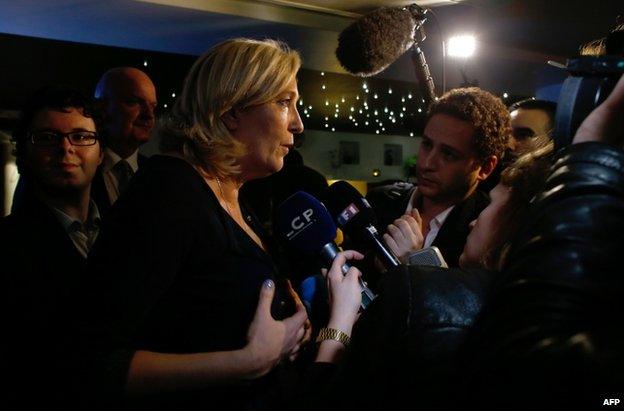
Marine Le Pen has made history with the French election success
The two big upsets of the elections are the far right coming first in France and Eurosceptics taking top spot in the UK.
In France, the National Front overcame its pariah status to win 24 seats, coming first in about 70% of the country's regions. The centre-right opposition UMP saw its share of seats shrink from 29 to 20, prompting party leader Jean-Francois Cope to announce his resignation in the autumn. The UMP has been dogged by a party funding scandal.
Meanwhile, the ruling Socialists lost only one seat, but remained with a meagre tally of 13. President Francois Hollande reacted by calling on the EU to reform and scale back its power,
The UK Independence Party (UKIP) had 27.5% of the vote and 24 MEPs in the UK. The opposition Labour Party, on 25%, narrowly beat the ruling Conservatives to take second place.
It was the first time in over a century that a national vote had not been won by either the Conservatives or Labour.
Soundbite: "They [the people] no longer want to be led by those outside our borders, by EU commissioners and technocrats who are unelected" - Marine Le Pen, leader of French National Front.

Spain, Greece, Portugal and Ireland
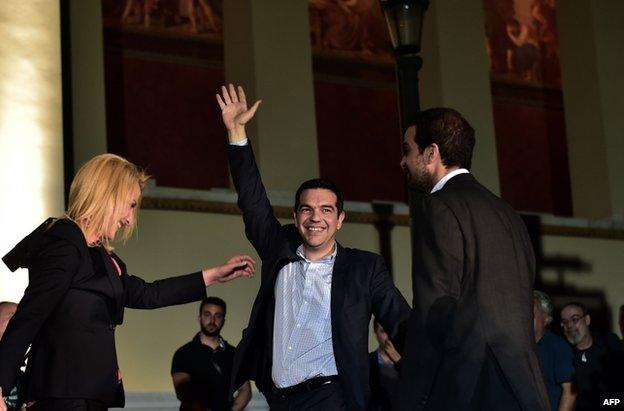
Syriza leader Alexis Tsipras celebrating in Athens
Parties of the radical left did well in the crisis-hit southern states of the eurozone but in Greece the far right continued to build support.
Defying opinion polls which forecast a single seat, Spain's new Podemos party, which has its roots in the indignado movement, won five seats and nearly 8% of the vote, coming fourth just behind the former communists. The ruling centre-right Popular Party remained in front but took heavy losses along with the opposition Socialists, the two parties losing eight and nine seats respectively.
In Greece, the far-left Syriza coalition came first with 26.6% (six seats) while the ruling conservative New Democracy party took 22.8% (five seats). But Golden Dawn, the far-right party whose leaders are under criminal investigation, came third with 9.4% and three seats.
After three years of austerity in Portugal, the opposition Socialists took the lead with 31.5% of the vote and eight seats, against 27.7% and seven seats for the ruling coalition of social democrat and centre-right parties.
In the Republic of Ireland, Sinn Fein, the former political wing of the Irish Republican Army militant group and a Syriza ally, won three seats - one short of Fine Gael, the senior party in the ruling coalition. The leader of the Labour Party, the coalition's junior partner, announced he was resigning. Eamon Gilmore's party failed to win any seats.
Soundbite: "We can't talk about the end, but we can talk about the beginning of the end of [the two-party system]" - Pablo Iglesias, leader of Podemos.

Italy
Alan Johnston: "The night belonged to...Matteo Renzi, who remains a believer in the European dream"
The surprise of the night for many was how the centre-left Democratic Party in the ruling coalition built itself a handsome lead, ending with nearly 41% of the vote and 31 seats.
Beppe Grillo's Eurosceptic Five Star Movement came second with 21% and 17 seats, doing worse than at the national election last year.
The Forza Italia party of disgraced former Prime Minister Silvio Berlusconi came third with 16.8% and 13 seats.
Soundbite: "Italy now has the task of showing that is a leader, not a follower, in Europe" - Prime Minister Matteo Renzi.

Belgium and the Netherlands
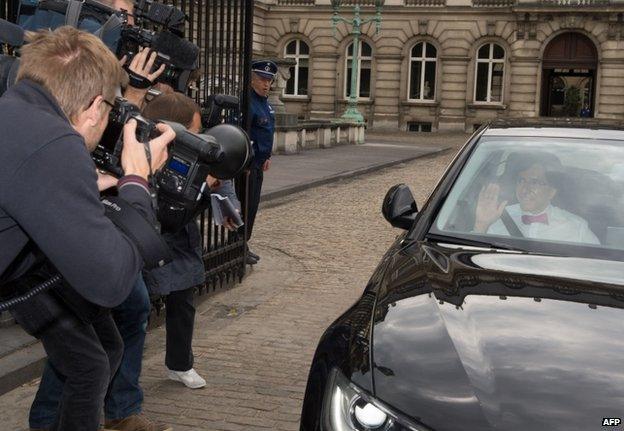
Prime Minister Elio Di Rupo waving as he leaves the Royal Palace in Brussels
The importance of the European elections in Belgium was eclipsed by the general election, in which Flemish nationalists came first. Prime Minister Elio Di Rupo, a Socialist from the French-speaking part of the country, resigned.
Mr Di Rupo had led his coalition government for two-and-a-half years, following a record period of 541 days when the country was without a government.
In a surprise result, the Eurosceptic Freedom Party of Geert Wilders fell from second place to fourth in the Netherlands, but still won three seats.
The Dutch also returned one MEP for the Party for the Animals for the first time.
Soundbite: "The Dutch have drawn the conclusion that the European Union means strength and extreme nationalism is a danger" - former Belgian Prime Minister Guy Verhofstadt.

Germany
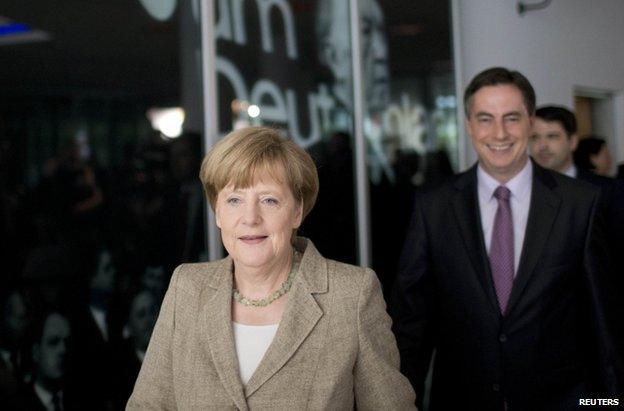
German Chancellor Angela Merkel arriving for a news conference in Berlin
Chancellor Angela Merkel's centre-right CDU/CSU consolidated its lead at 35.3%, while its junior partner in coalition, the Social Democrats, also got good news when it raised its share of the vote from 20.8% in 2009 to 27.3% this year.
There will be two German newcomers in the European Parliament: the anti-euro Alternative for Germany, with seven seats, and the far-right National Democratic Party, with one seat.
Soundbite: "We won't work with right-wing populists" - Bernd Lucke, leader of Alternative for Germany.

Northern states
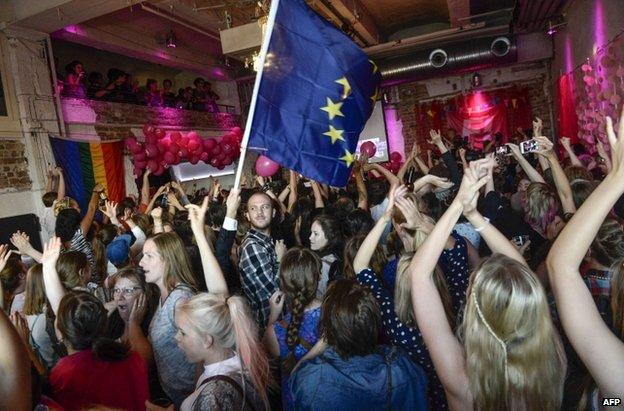
Feminist Initiative celebrations in Sweden
The anti-immigration People's Party came first in Denmark with four seats and nearly 27% of the vote. It distanced itself from the National Front in France and Golden Dawn in Greece. Correspondents say the party's success may put pressure on the ruling coalition to harden its own policies.
Sweden elected its first MEP from what is said to be the only formal feminist party in the European Parliament, the Feminist Initiative. It campaigned under the slogan, "Out With Racists And In With Feminists". Meanwhile, the anti-immigration Sweden Democrats won nearly 10% and two seats.
Finland's Eurosceptic True Finns Party won two seats and nearly 13% of the vote, falling well short of forecasts.
Soundbite: "It's deplorable that parties like Le Pen's National Front and Golden Dawn gain ground, but they do [so] because the established parties let the Europeans down" - Morten Messerschmidt, member of the Danish People's Party.

Eastern states
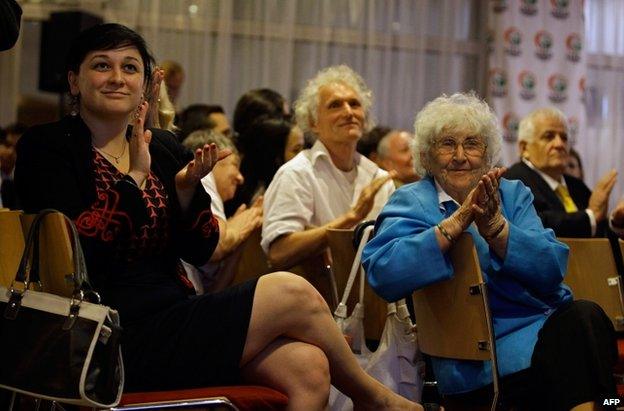
Jobbik supporters applauding in Budapest
Poland, which has the largest number of seats among the newer EU states (51), saw a tie in the number of seats won by the governing Civic Platform party and opposition Law and Justice party - 19 each.
In Hungary, the conservative Fidesz party of Prime Minister Viktor Orban did even better than at the general election last month, going from 45% to 51.5% and winning 12 seats.
The far-right Jobbik party won three seats again but its share of the vote fell from 21% in April to just under 15%.
Political instability continued in Bulgaria where the conservative opposition party Gerb, ousted last year after street protests, bested the ruling Socialists, winning 30.5% to 19%.
Soundbite: "Now go to Europe and never forget that Hungary comes number one. If we remember that, we can be great again" - Hungarian Prime Minister Viktor Orban.

Baltic states
Lithuania's elections were dominated by the run-off round of its presidential election, won convincingly by incumbent Dalia Grybauskaite who stood on an anti-Kremlin platform, warning of the threat posed by the current Russian leadership.
Soundbite: "We are in a vortex of threats today" - Dalia Grybauskaite, speaking just before the election.
